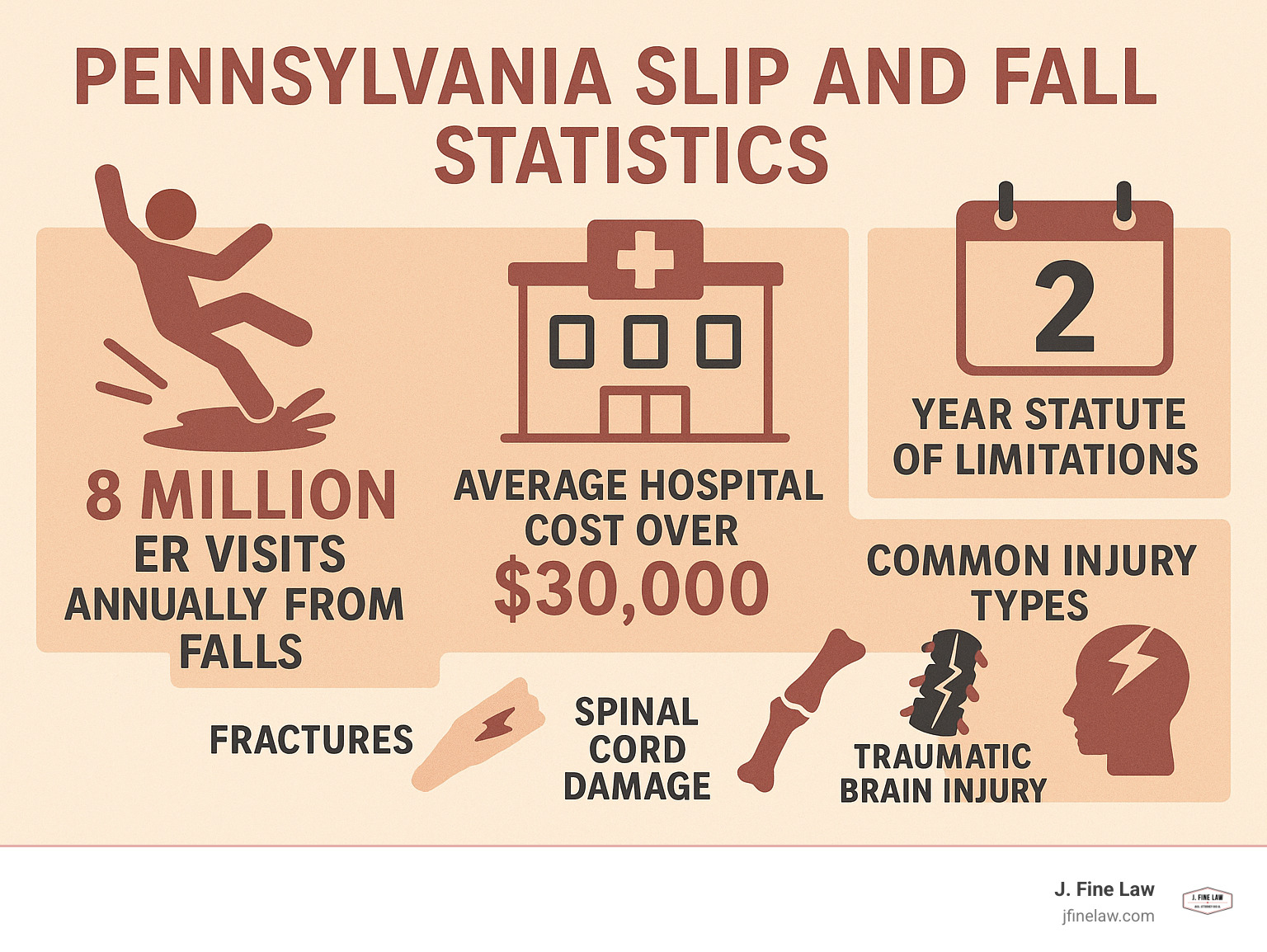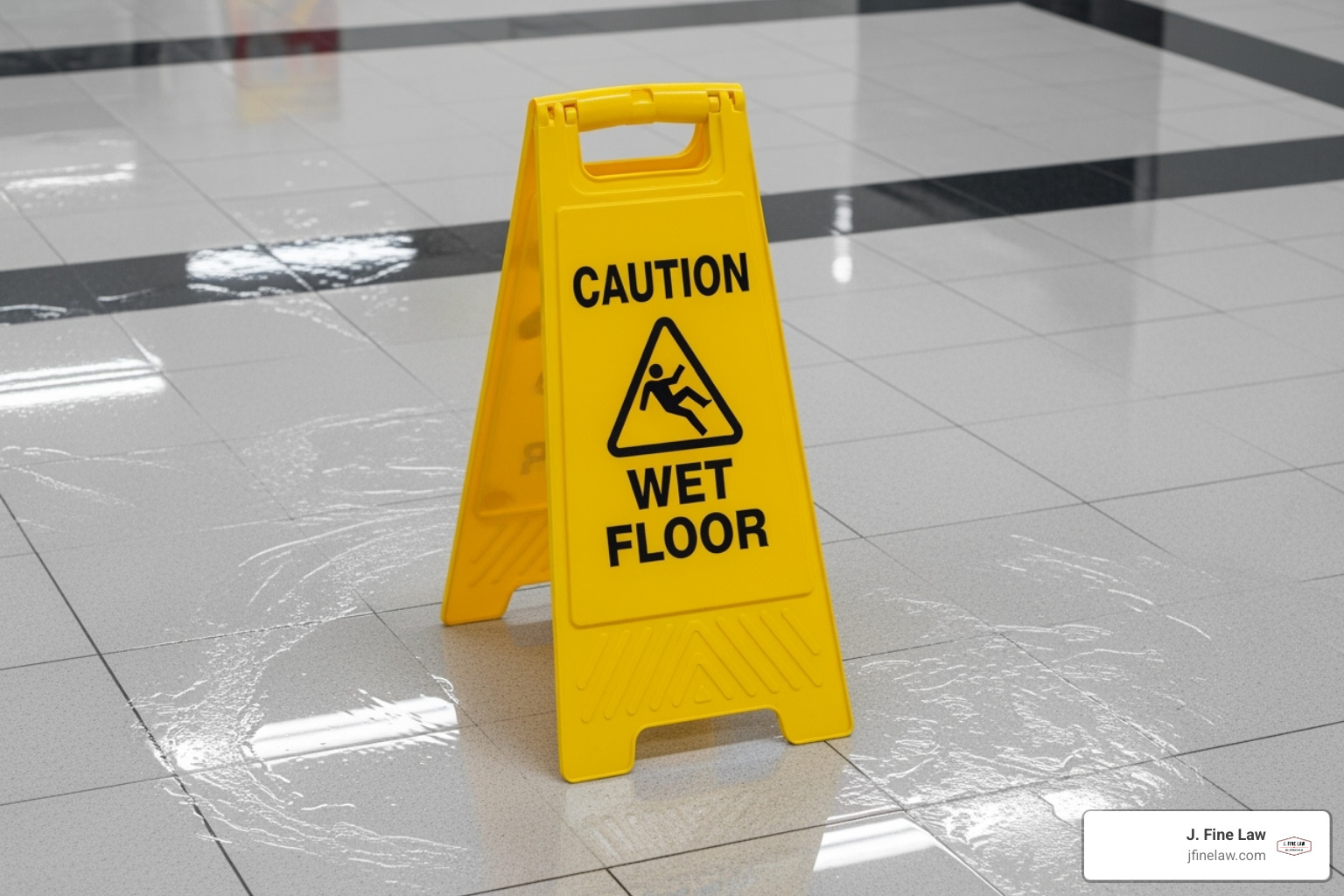When Life Takes an Unexpected Turn: Understanding Slip and Fall Injuries
When you need a slip and fall injury lawyer northeast philadelphia, you’re likely dealing with the sudden and severe consequences of an accident on someone else’s property. The path forward can feel overwhelming, filled with physical pain, mounting medical bills, and uncertainty about the future. Understanding your rights is the crucial first step toward recovery and justice.
Quick Answer for Northeast Philadelphia Slip and Fall Victims:
- Immediate Action: Your health is the priority, so seek medical attention right away. Then, if possible, document the scene with photos and report the incident to the property owner or manager to create an official record.
- Legal Rights: Property owners in Pennsylvania have a legal obligation to maintain safe premises or provide adequate warning of known hazards. If they fail in this duty, they can be held responsible for your injuries.
- Time Limit: In Pennsylvania, you generally have just two years from the date of the accident to file a lawsuit. This is a strict deadline, making it vital to act quickly to protect your rights.
- Compensation: You may be entitled to recover costs for all related medical bills (past and future), lost wages from time off work, compensation for your physical pain and emotional suffering, and other future expenses.
- Free Consultation: Most reputable personal injury attorneys offer a no-cost, no-obligation case evaluation to discuss the details of your accident and explain your legal options.
Slip and fall accidents are far from minor incidents. National statistics reveal a startling reality: falls account for more than 8 million emergency room visits annually, representing 21.3% of all ER visits. These aren’t just quick check-ups; they often involve serious injuries that require extensive and costly medical treatment. With the average hospital cost for a fall-related injury exceeding $30,000, the financial burden on a victim and their family can be catastrophic.
In Pennsylvania, the law is clear: property owners have a legal duty to keep their premises in a reasonably safe condition for visitors. When they neglect this duty—by failing to clean up a spill, de-ice a walkway, repair a broken step, or warn of a hidden danger—they can be held legally liable for the injuries that result. A simple trip to the grocery store or a walk through a parking lot can turn into a life-altering event in an instant due to someone else’s negligence.
I’m Jason Fine, a ten-time consecutive Pennsylvania Super Lawyers nominee with over 25 years of experience representing slip and fall victims throughout the region. As your slip and fall injury lawyer northeast philadelphia, I have seen the physical, emotional, and financial challenges you’re facing. My team and I are dedicated to helping you steer this difficult time and fight for the compensation you deserve.
Slip and fall injury lawyer northeast philadelphia vocabulary:
Understanding Your Rights After a Fall in Northeast Philadelphia
When you’ve been injured in a slip and fall, the first question often is, “What are my rights?” In Northeast Philadelphia, just like anywhere else in Pennsylvania, your rights are primarily governed by premises liability law. This area of law states that property owners have a legal responsibility, or “duty of care,” to ensure their premises are reasonably safe for visitors. When this duty is breached, and someone gets hurt as a direct result, the property owner may be held liable for damages.
Proving negligence and collecting evidence are crucial steps in building a strong case. It’s not always as simple as it seems, which is why understanding the nuances of the law is so important. We’re here to guide you through this complex landscape.
What Constitutes a Case for a Slip and Fall Injury Lawyer in Northeast Philadelphia?
A slip and fall accident occurs when a person is injured due to a hazardous condition on someone else’s property, causing them to lose balance and fall. These incidents can happen anywhere in Northeast Philadelphia – from local grocery stores and restaurants to public sidewalks, parking lots, and even private residences.
Common causes of slip and fall accidents that can lead to a valid claim include:
- Wet or Slippery Floors: Often due to spills from products, leaking freezers or pipes, tracked-in rain or snow, or recent mopping without proper warning signs. Think of that slick Wawa aisle, a puddle in a local grocery store, or a freshly waxed office lobby.
- Icy or Snowy Sidewalks and Parking Lots: Property owners have a responsibility to reasonably clear snow and ice from walkways. This is especially critical during Pennsylvania’s harsh winter months. Failure to salt, shovel, or plow in a timely manner can lead to serious falls and liability.
- Poor Lighting: Inadequate lighting in stairwells, hallways, parking garages, or outdoor pathways can obscure dangerous hazards like a broken step or a pothole, making it difficult for visitors to see where they are going.
- Uneven Surfaces or Debris: Cracked public sidewalks, torn or loose carpeting in an apartment building, broken tiles in a business, potholes in a parking lot, or objects and clutter left in walkways can all create dangerous tripping hazards.
- Broken or Missing Handrails: Stairwells without proper, sturdy handrails, or with ones that are loose or broken, are extremely dangerous and a common cause of severe fall-down accidents.
The injuries sustained in these accidents can range from minor bruises and sprains to severe, life-altering conditions. Common types of injuries we see include:
- Fractures: Broken bones are very common, especially in the wrists, ankles, and hips. According to the CDC, falls are the most common cause of hip fractures, with over 95% being caused by falling sideways.
- Spinal Cord Damage: A hard fall can cause herniated discs, fractured vertebrae, or other injuries to the back and neck, which can lead to chronic pain, limited mobility, or even paralysis.
- Head Injuries: Hitting your head during a fall can cause concussions and more severe Traumatic brain injury (TBI). These injuries can have long-lasting cognitive, physical, and emotional effects.
- Soft Tissue Injuries: These include painful sprains, strains, and tears to muscles, ligaments, and tendons that may not be visible on an X-ray but can cause significant pain and disability.
- Lacerations and Abrasions: Deep cuts and scrapes can result from a fall, sometimes requiring stitches and carrying a risk of infection or permanent scarring.
When you’re dealing with injuries from an ice-related fall, our team is ready to help. Learn more about how we can assist as your Philadelphia Ice Slip and Fall Lawyer.
The Legal Duty of Property Owners in Pennsylvania
In Pennsylvania, the level of care a property owner owes to a visitor depends on the visitor’s classification. It’s not one-size-fits-all, and understanding these distinctions is key to building a strong case.
Property owners, whether private homeowners, business owners, or even government entities, have a legal obligation to maintain their premises and take precautions to protect others from harm. This generally means they must either fix or remove potential hazardous risks or provide adequate warnings.
Here’s a breakdown of the duty of care owed:
| Visitor Classification | Definition | Duty of Care Owed by Property Owner |
|---|---|---|
| Invitee | A person on the property for the financial benefit of the owner, such as a customer in a store or a client in an office. | The highest duty of care. The owner must regularly inspect the property for hazards, repair them, and warn visitors of any dangers that are not obvious. |
| Licensee | A social guest or someone on the property for their own purpose with the owner’s consent (e.g., a friend visiting your home). | A lesser duty. The owner must warn the licensee of any known dangers that the guest is unlikely to find on their own. There is no duty to inspect for unknown hazards. |
| Trespasser | A person on the property without permission. | The lowest duty of care. The owner generally only has a duty to avoid intentionally or recklessly injuring the trespasser. |
It is important to note that there is a significant exception for child trespassers. Under the “attractive nuisance” doctrine, property owners may be held liable for injuries to children who are lured onto the property by a dangerous condition, such as an unfenced swimming pool or abandoned equipment.


